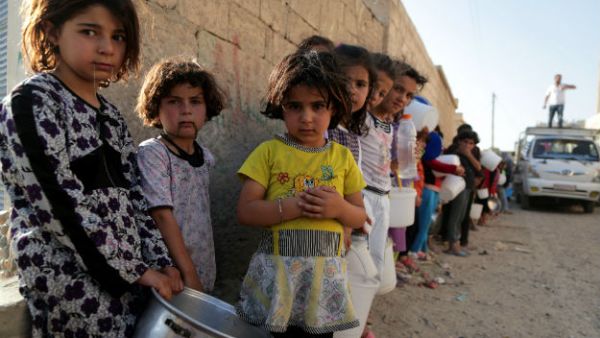Called by some security officials and Assad supporters as the “Starvation until Submission Campaign,” Syrian regime troops are using siege tactics to oust rebels from their stronghold areas, but at a fatal cost according to a Reuters report based on sources on the ground in the war-torn country.
The sieges, particularly in areas surrounding Damascus, have prevented food and medicine from entering the rebel strongholds, leaving civilians starving and suffering from treatable illnesses.
An army checkpoint official near the capital earlier this month refused to allow a young, teenage boy to bring in one bag of pita bread, despite his continuous begging for “just one loaf.”
The situation, however, was not so comfortable for the soldier as well, who shouted, “I’m telling you, not a single morsel is allowed in there. I don’t make the rules. There are those bigger than me and you who make the rules and they’re watching us right now. So go back home.”
As the boy left, the soldier let out a long, deep sigh.
This is not the only case where checkpoints and blockades are being used as a fatal weapon against the people of Syria. More than one million Syrians are suffering under such sieges, according to the UN’s figures. More than half are located in the country’s capital and approximately 310,000 are trapped in Homs. The sieges are designed to prevent any food or medicine from reaching the hands of opposition groups, regardless of the fact that unaffiliated civilians suffer as a result.
The towns surrounding the capital are under partial and total sieges, with Qudsaya and Hameh the most recent towns to fall victim to government sieges.
Residents from the two towns have already been restricted from movement this month, with forces forbidding them from visiting family outside their towns on the Eid al-Adha holiday. Some were allowed to leave on foot, but most cars have been forbidden to enter or exit the towns. In Hameh, a predominantly Sunni town, government forces are preventing any and all traffic from entering and exiting the town. In Qudaysa, a more religiously diverse area, regime forces are more laxed on who can-and cannot-come and go.
The only individuals permitted to pass from these two towns and elsewhere rather regularly are those carrying public sector worker identity cards and schoolchildren. Of course, if they are lucky….
At the checkpoints, soldiers further conduct vehicle and body searches to ensure that no items, including bread, medicine, and even baby milk are “smuggled” into the towns. If caught carrying such items, one can face detention and jail. The extensive searches often create hours-long ques.
Moadamieh, which has been under siege for a year and victim to chemical weapon strikes, has been completely surrounded by military forces and blockades. Despite some evacuations organized by the UN earlier this month, approximately 12,000 people still face starvation and death, 90 percent of the village has been destroyed since the siege, and recent government airstrikes have damaged the last pipelines that deliver drinking water to the sieged civilians. Local doctors sent Reuters videos showing six deaths caused by malnutrition; the majority of the victims were children.
Smuggling items to the sieged town is further out of the question with government snipers on guard on the highway near the town, which was once used by civilians to obtain bread and other supplies. “No one can smuggle anything to us anymore,” said Moadamieh resident Qusai Zakarya, “only the souls of the departed can leave [Moadamieh].”
According to Reuter’s source on the ground, many of the civilians in the sieged towns must gather fruit and vegetables from remaining fields not targeted by snipers and shell attacks, but farmers are often targeted when they try to harvest their crops. Pita bread is not available anywhere in the towns, but civilians with cash can sometimes pay smugglers to bring in bags of flour, related foodstuffs and medicine.
Town’s infrastructures are heavily damaged from airstrikes that have contaminated water and sewage systems. Doctors remaining in the sieged towns are thus regularly treating water-borne diseases among sieged civilians, and have been increasingly observing symptoms of malnutrition such as dehydration, extreme weightloss, dysentery, and bloated stomachs. Polio cases have also been recently reported in the once polio-free country.
International aid agencies have little to no access to the sieged areas, despite international pressure on the Syrian regime to open humanitarian corridors. Though sieges are not specifically illegal under international law, deliberate starvation can be tried as a war crime and the law of armed conflict requires that civilians have free access to humanitarian relief.
The Syrian regime has yet to provide official comment on its hunger tactics as a weapon of war.








